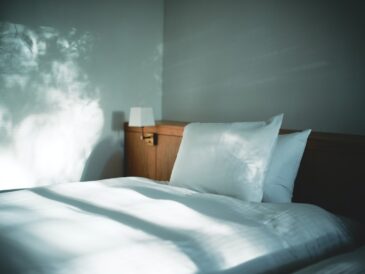Sleep experts generally suggest adults need between seven and nine hours of restful slumber each night, though many individuals struggle with getting this amount, particularly as they age.
This study utilized data from the 2020 NHIS to investigate the prevalence of self-reported sleep difficulties by age group and gender, using two indicators, SLEEPDIST and TIREDNESS respectively. Below are graphs depicting these results.
Young Adults
Young adults experience poor sleep for many reasons. Their lives are changing quickly: attending college/vocational school, finding their first jobs, having children. Social media usage may also interfere with sleep. Furthermore, this age group is more likely than others to struggle with depression; severe cases may make falling and staying asleep difficult or lead to thoughts of suicide.
Adolescence causes changes to one’s circadian rhythm, leading teens to naturally desire later bedtimes and later wake-up times, though this can often prove challenging given school and extra-curricular activities. Sleep deprivation has the ability to negatively impact mood and performance negatively by making one irritable, less motivated, less able to think clearly and more likely engaging in risky behavior like speeding or taking drugs.
Sleep levels decline with age, reaching an all-time low around 40 due to increasing responsibilities such as caring for children or managing a job. Furthermore, many seniors suffer from medical conditions which interfere with restful leg syndrome or periodic limb movement disorder which make sleeping harder than ever before.
Older Adults
Though many older adults believe that sleep issues are an inevitable part of getting older, they shouldn’t. Poor sleep has been linked with memory issues, dementia risks and depressed mood in addition to increasing risk for falls or hospitalization later on in life.
One of the primary sleep issues among older adults is insomnia, or difficulty sleeping throughout the night. This could be caused by changes to daily routines, such as retirement or moving into a nursing home, or by changes in medical status or medications taken; arthritis, gout, heartburn and sleeping disorders like snoring and sleep apnea can all interfere with one’s sleeping patterns and disrupt one’s REM cycle.
Excessive daytime drowsiness is another prevalent symptom among older adults. While this could be caused by numerous factors – prostate enlargement in men or bladder problems in women for instance – it’s more often the result of depression or cognitive impairment that’s at play here.
Older adults can often wake during the night to use the bathroom, creating sleep disturbances that increase risk of falling and prolong chronic diseases or medication usage. These episodes of awakening to use the restroom may especially irritate those living with multiple conditions or taking multiple drugs simultaneously.
Teens
Parents often mistake their teens for being lazy, obstinate and difficult, when the truth is they simply need more sleep. Adolescence marks an intense period of brain development requiring restful nights for proper growth and this factor plays a pivotal role during that period.
Sleep can help teenagers make smart decisions in school, work and relationships while protecting them against mental health conditions such as depression and anxiety. Too little rest can impair learning and concentration abilities while mood swings may result in risky behavior such as driving while drowsy or even suicidal thoughts.
Teens also struggle to sleep due to a biological shift that takes place around age 14. Many become night owls, telling tales about pulling all-nighters or sleeping through Saturday classes; yet due to early school start times and busy schedules of homework, extracurricular activities, and part-time jobs, often leave only six or seven hours a night available for restful slumber.
Some teens experience chronic insomnia, often as the result of poor sleeping habits and eating sugary and high-fat foods that raise and crash blood sugar levels throughout the night, keeping them awake. It could also be an indicator of medical or mental-health conditions, medication side effects or alcohol or drug abuse – factors which need to be evaluated carefully in order to get proper relief.
Children
Kids need adequate restful sleep to excel at school, sports and socializing with peers. Unfortunately, too many aren’t receiving enough rest and may become irritable or forgetful as well as have difficulties managing emotions – though a good night’s rest can reverse some of these issues.
Sleep needs depend on a child’s age; infants require at least half of each day spent sleeping, while toddlers and preschoolers may require less. By grade school age, children should be getting around 10 hours of rest per night; unfortunately however, nearly three quarters of school-age children get less than nine hours each night and this lack of rest increases the chance of injuries that require medical attention.
Sleep deficit can impede learning in several ways: children without enough Zzz’s may find it harder to stay centered during lessons and focus on them effectively, becoming irritable or acting out in inappropriate ways.
Lack of sleep increases children’s risk for obesity and other health issues. Sleep disorders, like central sleep apnea or snoring, may contribute to their poor quality of restful restful slumber; others struggle with delayed phase sleep syndrome that interferes with falling or rising at the appropriate times for restful REM slumber.




